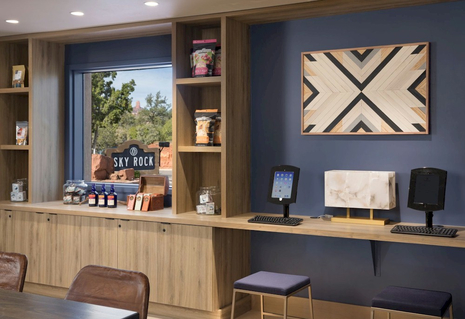The Business of Delivering Unmatched Service to Today's Guest | By Stan Kennedy

The Business of Delivering Unmatched Service to Today's Guest
Guests can also access breathtaking views while lounging at Sky Rock Sedona's outdoor patio. |

The Business of Delivering Unmatched Service to Today's Guest
Guests have access to a food and drink bar at Sky Rock Sedona. |
At its core, hotel management companies are in the business of delivering unmatched service, products and experiences to guests.
However, during the pandemic, companies had to reprioritize to focus on offerings consistent with extreme financial pressures, labor pressures, and supply chain pressures thus making adjustments and modifications to maintain business while keeping guests and associates safe.
After nearly three years, it is time to move beyond the pandemic and find ways to deliver extraordinary service experiences to all guests consistently.
Today, hotel rates are at record-high levels, which has elevated guest expectations. Guests no longer accept reduced service and standards, and rightfully expect above-and-beyond experiences, which increasingly include upgraded fitness equipment, smart technology, upgraded rooms, and full-service food and beverage options that reflect what today's consumers prefer.
Providing Exceptional Guest Service
The key to providing top-notch guest services is the people. It starts with leadership establishing an empowered, service-minded culture across property staff. Management must take various steps to create a motivated and productive team that works together to create an unmatched experience. This begins with instilling a non-negotiable approach to genuine hospitality, executing the strategy and proper tools to prepare for present and future guests. Interdepartmental communication should also take place to ensure a flawless follow-through with service delivery. It is also vital that there is consistent engagement with guests throughout their stay and that teams be ready with solutions to address the matter immediately when something doesn't go as planned.
Teams should focus on three major areas regarding guest services: consistency, providing genuine hospitality, and customizing the experience. First and foremost, guests expect consistency across hotel brands. This includes the basics of providing clean guest rooms and access to other standard amenities, like activities and recreation.
The second priority is to shift the feeling of transactional communication to one of warmth and genuine hospitality. Professionals should approach each guest request with the attitude of "Yes is the answer, now what is the question?" For this to happen, hoteliers must train associates to deliver on the promise and follow through on service that exceeds expectations, leaving guests wanting to come back for another stay at the property. Creating a company culture where every employee has mission buy-in makes for a happy and uplifting environment for guests. Constant communication, reference to the company mission and continuous reevaluation of goals motivate employees to cultivate an environment where they can reach their full potential and meet career goals.
Lastly, creating an experience that provides a positive memory of the hotel for guests in a way the reverses the commoditization of the industry is vital. With the significant increase in independent and lifestyle hotels to include short-term rentals, more consumers are seeking unique experiences that are customized to their own preference instead of the cookie-cutter hotel experiences. Through technology enhancements, hotels are moving in this direction via guestroom entertainment platforms that not only allow for personalization, but supplement guests' preferences through streaming entertainment. Social media serves as a huge no cost billboard for hotels that are able to fully embrace the delivery of these unique experiences.
Rising Trends: Customization and Technology
While a significant number of travelers still prefer the comfort and convenience of a standard hotel experience – typically associated with traditional national brands – there is a large and growing demographic of travelers who seek unique, customized hotel experiences, which has led to the dramatic growth of lifestyle hotels.
Integrating new technology plays a substantial role in personalizing today's hotel experience by paving the way for elevated, tech-forward services that speak to the traveler. By having a robust database of information to deliver memorable moments, property management systems store information for returning guests, including milestones like birthdays, anniversaries, the number of previous stays, and loyalty status, along with preferences related to amenities, room locations, and type. These systems also provide a history of any issues that might have occurred during past stays, thus enabling the hotel team to anticipate the guest's arrival and make for a seamless experience.
Providing guests with the option to mobile check-in, digital keys, and interactive apps, gives guests insight into their stay at their fingertips. For example, guests will receive real-time notifications if their accommodations need cleaning, eliminating the waiting period in lobbies and maximizing their trips by allowing them to spend more time exploring local sites or relaxing at the pool. Hoteliers have also noticed that the addition of wristband technology – like those you see at Disney– has helped ease technology integration. With the wristband, guests can access their room and use their credit card with a simple tap.
Incorporating technology and AI into hospitality also help enhance operational efficiency while keeping up with ever-changing customer expectations. For example, staff can now assist multiple guests simultaneously via mobile chat. It also unlocks the ability for seamless mobile check-in, providing guests access to their rooms and creating an efficient system for both them and the staff. Additionally, with the integration of beacon technology, hotels can pull real-time guest data to enhance the experience further. This can be used to alert guests about programming across hotels based on location and interests.
For example, if a guest is lounging by the pool, they may be alerted that beach volleyball is taking place in a different area. If guests indicate they're interested in fitness, they can be alerted about a yoga class starting in 20 minutes. This technology can also utilize past guest reviews to inform decision-making. For example, when a guest learns about the upcoming yoga class, the app can also tell them that 50 previous participants recommend it. This is just the start of how technology can aid in a successful stay for guests. As technology evolves, hotels must also enhance onsite offerings to stay ahead of the competition.
What's to Come
2022 was a rebuilding year in hospitality, especially as the industry worked diligently to fill many open staffing positions. This year, it's vital that hoteliers finetune the service delivery experience through additional training. Hoteliers are at a service inflection point as occupancy growth has slowed and guests have more hotel options than ever. Professionals should approach every day with the mindset that it is their only opportunity to provide customers with a positive experience.
Guest expectations are constantly evolving, so it's essential to keep a finger on the pulse of trends. For example, a significant focus is currently on fitness, health, and wellness. Guests will expect fitness centers filled with Peloton bikes, areas for outdoor activities like yoga, and healthy food options. Additionally, hotels are moving more towards personalizing guests' stays by onboarding innovative technology. More and more hotels will onboard mobile apps to provide guests with enhancements like streaming services, the ability to order room service or make dinner reservations, control room temperature, and even chat with employees at the front desk. Hotels will also see more tipping apps introduced to cater to travelers who no longer carry cash but wish to tip hotel associates for excellent service.
Robotics will also be incorporated in new and exciting ways in the coming years. As hotels contend with the hiring shortage, teams could very well begin use robotics to deliver items to guests, assist with housekeeping, and even check guests in. They will be a game changer in the food and beverage sector as they reduce the need for human touch and cross-contamination. While robots cannot account for all variables, like guests who require a gluten-free preparation or request extra salt, they can help with the overall efficiency when serving and preparing food.
Of course, this is forward-looking and there are research and development organizations working on solutions like these that could be very beneficial to the industry. However, genuine guest service should always be provided by associates, and therefore organizations must not only continue to train but also expand service delivery training and culture as this work is never complete.
Gone are the days of accepting reduced service levels and amenities. Today's guests are looking for staff, services, and experiences that go above and beyond when traveling, and it is up to hotel management companies to deliver just that.
Excellent Customer Service? It Starts at the Top! | By Brenda Fields
Have You Noticed What is Missing from the Full Service Hotel Experience? | By Chuck Kelley
Remington Hospitality
www.remingtonhospitality.com/
14185 Dallas Parkway, Suite 1150
USA - Dallas, TX 75254
Phone: +1 972 980 2700
Email: info@remingtonhotels.com
Hotel Food and Beverage Thrives on People, Who Are the Best Investment | By Stephen Wittman
Bridging Workforce Gaps in Hospitality | By Rick Badgley
Remington Hospitality To Manage Sofitel Chicago Magnificent Mile
